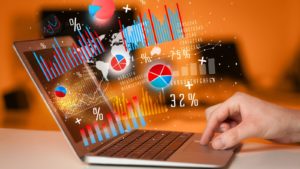Intuit (NASDAQ:INTU) is a financial technology stock that tends to fly under the radar which is strange given Intuit stock is up 850% over the past decade.
Although it’s got a couple of strong franchises in TurboTax and QuickBooks, it’s probably best known for Danny Devito’s television ads. They’re quirky yet effective.
It’s hard to believe, but Intuit’s been around since 1984 and a public company since its IPO in March 1993. Intuit went public at $20 a share. In the 26 years since it’s had three stock splits. One hundred shares bought for $2,000 in 1993 are now 1,200 shares and worth $26,627, a compound annual growth rate of 10.5%.
Despite a large number of competitors, both public and private, Intuit’s always managed to keep pace with its peers through innovation and products that generally are easy to use and relatively inexpensive to own.
It’s helped millions of small businesses keep their financial records straight while also enabling millions more to do their own taxes.
As fintech stocks go, Intuit’s one of the best. Here are seven reasons why.
Reasons to Own Intuit Stock: It’s Very Profitable

Intuit delivered better than expected fourth-quarter results August 22. The news helped propel INTU stock higher only to lose all of the gains come September.
Analysts expected Intuit to lose $0.14 in the quarter on $961 million in revenue. Intuit delivered a loss of just 9 cents on $994 million in sales. The slowest quarter of the year, the company finished the fiscal year with operating profits of $1.85 billion, 19% higher than a year earlier, on $6.78 billion in revenue.
“Our business continued its strong momentum in the fourth quarter, resulting in full year revenue growth of 13 percent, exceeding our original guidance of 8 to 10% growth,” said Sasan Goodarzi, Intuit’s CEO. “These results were fueled by 15% growth in the Small Business and Self-Employed Group, and 11 percent growth in the Consumer Group.”
When profits and revenues rise by double digits that usually translates into higher free cash flow, Intuit is no different growing it to $2.17 billion at the end of July, 9.2% higher than a year earlier.
One of the things CEOs do with free cash flow is to buy back shares. In 2019, Intuit repurchased $561 million of its stock. It has $2.7 billion left on its current share repurchase program.
Reasons to Own Intuit Stock: Strong Balance Sheet

It stands to reason that when you’re generating healthy profits and free cash flow, your balance sheet is bound to be healthy.
At the end of July, Intuit had short- and long-term debt of $50.0 million and $386 million, respectively, along with $2.7 billion in cash, cash equivalents, and investments for net cash of $2.3 billion or 3.3% of its $69.2 billion market cap.
By comparison, H&R Block (NYSE:HRB), its biggest competitor in the tax space, had net cash of $79.4 million or 1.6% of its $4.8 billion market cap.
When you consider that Intuit’s interest expense in 2019 was $15 million, less than former CEO Brad Smith’s 2018 compensation, the comparison tells you all you need to know about the company’s financial strength.
Reasons to Own Intuit Stock: Operates High-Demand Businesses
As I said earlier, Intuit’s major franchises are TurboTax and QuickBooks.
TurboTax, which Intuit acquired for $225 million in September 1993, created a $600 million business with a strong presence in both financial management and tax management. The merger, which brought together two profitable companies, was the beginning of INTU stock’s incredible winning streak.
Shareholders of TurboTaxes’ parent, Chipsoft, received 7.25 million shares of INTU stock. Today, those shares are worth $23.7 billion.
TurboTax continues to benefit from the consumer’s desire to do their taxes at home rather than schlepping a box of receipts down to the local H&R Block office. In 2019, 68% of Americans said they would file their taxes online, up from 53% a decade earlier.
As more people chose online tax preparation, TurboTax’s gross margins moved higher, creating a profit machine like few others.
“Given Intuit’s dominant position in the DIY space, and the growing momentum behind its TurboTax Live offering in the assisted category, we believe another year of double-digit Consumer Tax growth is well within reach,” said Stifel’s Brad Reback in a note to clients September 14.
As for QuickBooks, Intuit finished 2019 with 3.4 million online subscribers, 43% higher than a year earlier. In terms of revenue, both online and desktop, QuickBooks accounted for $1.7 billion of the company’s overall revenue, 40% higher than in 2018.
The addition of online subscribers will continue to generate year over year revenue growth.
Reasons to Own Intuit Stock: Good Use of Technology

Is Intuit a financial services company that happens to use technology well? Or is it a technology company that happens to sell financial products?
That’s a tough question to answer.
In 2018, QuickBooks Capital originated $316 million in term loans to small business customers, bringing overall total funding since launching the initiative in November 2017 to $441 million. That said, Intuit is not a bank. However, it is lending its own capital to its small business customers, using all the data it has on these businesses to make an educated underwriting decision.
To date, it’s yet to have any material losses.
In 2019, Intuit spent $1.2 billion or 18.2% of its overall revenue, on research and development, the innovation juice necessary to keep creating new products and services. H&R Block makes no accounting for research in its 10-K, an indication of how little it invests in innovation.
At the end of August, Intuit announced that QuickBooks customers could provide benefits to its employees directly through QuickBooks Online Payroll in partnership with SimplyInsured.
“We know that many small business owners want to do right by their employees and offer health insurance benefits, but many feel it’s too expensive or confusing,” said Olivier Bartholot, Director of QuickBooks Payroll. “By connecting them with affordable medical, dental and vision insurance directly within QuickBooks, we’re making it easy, fast and cost effective for small businesses to offer their employees insurance plans, helping them to attract and retain top talent.”
By investing as much as Intuit does in R&D, it’s able to provide the technology necessary to deliver this kind of initiative. It’s why it’s miles ahead of H&R Block any other of its peers.
Reasons to Own Intuit Stock: Long-Term Succession Planning

A year ago, August, Intuit announced that Sasan Goodarzi, then the company’s executive vice president, would succeed Brad Smith as its CEO on January 1. At the time of the announcement, Smith and Goodarzi were just 54 and 50, respectively, hardly the retirement age.
“I never wanted to be that athlete who loses half a step or can’t complete the pass,” he told Fortune in an exclusive pre-announcement interview. “I wanted to step down when I was still in my learning zone and still had gas in the tank.”
Goodarzi ran the company’s Small Business & Self-Employed segment which includes QuickBooks. In fiscal 2019, the division accounted for 52% of the company’s $6.78 billion in total revenue. He was the natural person to take the helm. Born in Tehran, Goodarzi sees a lot of opportunities outside the U.S. However, to get beyond 5% of its revenue generated internationally, it’s got to create products and services that can be rolled out in many countries.
After delivering two solid quarters in fiscal 2020, Goodarzi has gotten off to a strong start. With both the founder, Scott Cook, and the former CEO still on the board, Intuit shareholders have nothing to worry about.
Intuit’s got a deep bench.
Reasons to Own Intuit Stock: Acquisitions

According to Crunchbase, Intuit’s made 29 acquisitions in its 35-year history, an average of less than one per year.
The company’s most recent acquisition is Origami Logic, a marketing insights platform that Intuit bought in May. No financial details were released about the transaction. However, we do know that Origami Logic had raised $64 million in VC funding before agreeing to be acquired.
“As we enter our next chapter of transformation, having a strong data architecture lies at the heart of Intuit’s strategy to deliver valuable insights to our customers,” CEO Sasan Goodarzi said in a statement. “This acquisition will accelerate Intuit’s ability to organize, understand, and use data to deliver personalized insights that help customers quickly achieve success and build confidence whenever they use Intuit products.”
This was the CEO’s first acquisition since taking over for Brad Smith.
Given the push by fintech companies into data analytics, machine learning, and AI, this acquisition enables it to provide its customers with leading-edge business and data analytics at a reasonable price.
Reasons to Own Intuit Stock: Stock Performance

After everything else that’s been said about Intuit, it seems only right to finish off this article by discussing its stock performance, something I alluded to in the intro.
INTU is up 35.8% year to date including dividends through September 17. With less than four months left in 2019, if the gains hold, the company will have delivered an 11th consecutive year of stock gains for its shareholders.
No one has benefited from these gains more than former CEO and current Executive Chairman, Brad Smith, who owns 1.05 million shares of its stock. Smith’s 11 years in the top job saw him obtain significant financial wealth with his shares worth almost $300 million at current prices.
Not only did Smith become very wealthy from his ownership stake, but he was also paid well. In his last three years as CEO, Smith earned $56.3 million in total compensation, a good chunk of it from stock and option awards.
However, when you deliver an 850% return over the past decade, shareholders aren’t nearly as likely to be too concerned about this particular executive’s overall pay package.
At the time of this writing Will Ashworth did not hold a position in any of the aforementioned securities.

